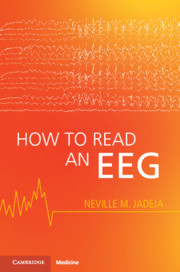Book contents
- How to Read an EEG
- How to Read an EEG
- Copyright page
- Dedication
- Contents
- Figure Contributions
- Foreword
- Preface
- How to Read This Book
- Part I Basics
- Chapter 1 Introduction
- Chapter 2 Polarity
- Chapter 3 Montages
- Chapter 4 Localization
- Chapter 5 Active Reference
- Chapter 6 Frequencies and Rhythms
- Chapter 7 Maturation
- Chapter 8 Normal Adult EEG
- Part II Interpretation
- Part III Specific Conditions
- Appendix How to Write a Report
- Index
- References
Chapter 5 - Active Reference
from Part I - Basics
Published online by Cambridge University Press: 24 June 2021
- How to Read an EEG
- How to Read an EEG
- Copyright page
- Dedication
- Contents
- Figure Contributions
- Foreword
- Preface
- How to Read This Book
- Part I Basics
- Chapter 1 Introduction
- Chapter 2 Polarity
- Chapter 3 Montages
- Chapter 4 Localization
- Chapter 5 Active Reference
- Chapter 6 Frequencies and Rhythms
- Chapter 7 Maturation
- Chapter 8 Normal Adult EEG
- Part II Interpretation
- Part III Specific Conditions
- Appendix How to Write a Report
- Index
- References
Summary
Referential montages are only as good as their reference electrode. The reference electrode is intended to be distant from the potential focus and inactive, but sometimes it may be very active. This is called an active reference; it misleads the reader into false localization. An active reference occurs if the reference electrode lies close to the potential focus or becomes contaminated by artifactual potentials. If the reference is at or near the focus, typically there is a unidirectional reflection (often with varying amplitudes) in all the channels. If the reference is contaminated by an artifactual potential, typically there is a phase reversal over channels that overlie a potential focus. Central references are prone to contamination with sleep potentials and ear references are prone to contamination with EKG and temporalis artifact. Switch to an alternative referential montage if you suspect an active reference. This is easy with a digital display.
- Type
- Chapter
- Information
- How to Read an EEG , pp. 29 - 31Publisher: Cambridge University PressPrint publication year: 2021

